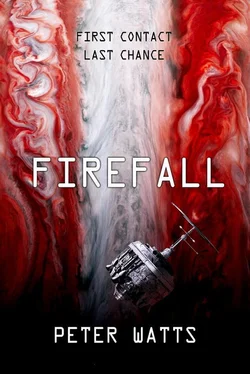My heart is warm, at least. A tiny nuclear fire burns in my thorax, leaves me indifferent to the cold outside. It won’t go out for a thousand years, barring some catastrophic accident; for a thousand years, I will listen for faint voices from Mission Control and do everything they tell me to. So far they have told me to study comets. Every instruction I have ever received has been a precise and unambiguous elaboration on that one overriding reason for my existence.
Which is why these latest instructions are so puzzling, for they make no sense at all. The frequency is wrong. The signal strength is wrong. I cannot even understand the handshaking protocols. I request clarification.
The response arrives almost a thousand minutes later, and it is an unprecedented mix of orders and requests for information. I answer as best I can: yes, this is the bearing at which signal strength was greatest. No, it is not the usual bearing for Mission Control. Yes, I can retransmit: here it is, all over again. Yes, I will go into standby mode.
I await further instructions. They arrive 839 minutes later, and they tell me to stop studying comets immediately.
I am to commence a controlled precessive tumble that sweeps my antennae through consecutive 5°-arc increments along all three axes, with a period of 94 seconds. Upon encountering any transmission resembling the one which confused me, I am to fix upon the bearing of maximal signal strength and derive a series of parameter values. I am also instructed to retransmit the signal to Mission Control.
I do as I’m told. For a long time I hear nothing, but I am infinitely patient and incapable of boredom. Eventually a fleeting, familiar signal brushes against my afferent array. I reacquire and track it to source, which I am well-equipped to describe: a trans-Neptunian comet in the Kuiper Belt, approximately two hundred kilometers in diameter. It is sweeping a 21-cm tightbeam radio wave across the heavens with a periodicity of 4.57 seconds. This beam does not intersect Mission Control’s coordinates at any point. It appears to be directed at a different target entirely.
It takes much longer than usual for Mission Control to respond to this information. When it does, it tells me to change course. Mission Control informs me that henceforth my new destination is to be referred to as Burns-Caulfield . Given current fuel and inertial constraints I will not reach it in less than thirty-nine years.
I am to watch nothing else in the meantime.
* * *
I’d been liaising for a team at the Kurzweil Institute, a fractured group of cutting-edge savants convinced they were on the verge of solving the quantum-glial paradox. That particular log-jam had stalled AI for decades; once broken, the experts promised we’d be eighteen months away from the first personality upload and only two years from reliable Human-consciousness emulation in a software environment. It would spell the end of corporeal history, usher in a Singularity that had been waiting impatiently in the wings for nigh on fifty years.
Two months after Firefall, the Institute cancelled my contract.
I was actually surprised it had taken them so long. It had cost us so much, this overnight inversion of global priorities, these breakneck measures making up for lost initiative. Not even our shiny new post-scarcity economy could withstand such a seismic shift without lurching towards bankruptcy. Installations in deep space, long since imagined secure by virtue of their remoteness, were suddenly vulnerable for exactly the same reason. Lagrange habitats had to be refitted for defense against an unknown enemy. Commercial ships on the Martian Loop were conscripted, weaponised, and reassigned; some secured the high ground over Mars while others fell sunward to guard the Icarus Array.
It didn’t matter that the Fireflies hadn’t fired a shot at any of these targets. We simply couldn’t afford the risk.
We were all in it together, of course, desperate to regain some hypothetical upper hand by any means necessary. Kings and corporations scribbled IOUs on the backs of napkins and promised to sort everything out once the heat was off. In the meantime, the prospect of Utopia in two years took a back seat to the shadow of Armageddon reaching back from next Tuesday. The Kurzweil Institute, like everyone else, suddenly had other things to worry about.
So I returned to my apartment, split a bulb of Glenfiddich, and arrayed virtual windows like daisy petals in my head. Everyone Icons debated on all sides, serving up leftovers two weeks past their expiry date:
Disgraceful breakdown of global security.
No harm done.
Comsats annihilated. Thousands dead.
Random collisions. Accidental deaths.
(who sent them?)
We should have seen them coming. Why didn’t we—
Deep space. Inverse square. Do the math.
They were stealthed
!
(what do they want ?)
We were raped!
Jesus Christ. They just took our picture .
Why the silence?
Moon’s fine. Mars’s fine.
(Where are they?)
Why haven’t they made contact?
Nothing’s touched the O’Neills.
Technology Implies Belligerence!
(Are they coming back?)
Nothing attacked us. Yet .
Nothing invaded . So far .
JIM MOORE VOICE ONLY
ENCRYPTED
ACCEPT?
The text window blossomed directly in my line of sight, eclipsing the debate. I read it twice. I tried to remember the last time he’d called from the field, and couldn’t.
I muted the other windows. “Dad?”
“Son,” he replied after a moment. “Are you well?”
“Like everyone else. Still wondering whether we should be celebrating or crapping our pants.”
He didn’t answer immediately. “It’s a big question, all right,” he said at last.
“I don’t suppose you could give me any advice? They’re not telling us anything at ground level.”
It was a rhetorical request. His silence was hardly necessary to make the point. “I know,” I added after a moment. “Sorry. It’s just, they’re saying the Icarus Array went down, and—”
“You know I can’t—oh.” My father paused. “That’s ridiculous. Icarus’s fine.”
“It is?”
He seemed to be weighing his words. “The Fireflies probably didn’t even notice it. There’s no particle trail as long as it stays offstream, and it would be buried in solar glare unless someone knew where to search.”
It was my turn to fall silent. This conversation felt suddenly wrong .
Because when my father went on the job, he went dark. He never called his family.
Because even when my father came off the job, he never talked about it. It wouldn’t matter whether the Icarus Array was still online or whether it had been shredded and thrown into the sun like a thousand kilometers of torn origami; he wouldn’t tell either tale unless an official announcement had been made. Which—I refreshed an index window just to be sure—it hadn’t.
Because while my father was a man of few words, he was not a man of frequent, indecisive pauses—and he had hesitated before each and every line he’d spoken in this exchange.
I tugged ever-so-gently on the line—“But they’ve sent ships.”—and started counting.
One one-thousand, two one-thousand—
“Just a precaution. Icarus was overdue for a visit anyway. You don’t swap out your whole grid without at least dropping in and kicking the new tires first.”
Nearly three seconds to respond.
Читать дальше








